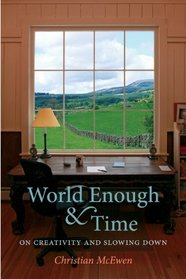Search -
World Enough & Time
World Enough Time
Author:
World Enough and Time focuses on the positive effect of deliberately simple living on creativity. McEwen juxtaposes religious traditions of both the East and West, and intertwines words of wisdom from writers ranging from Montaigne to Ralph Waldo Emerson and from Virginia Woolf to Jack Kerouac to Adrienne Rich, artists and musicians from John Ru... more »
Author:
World Enough and Time focuses on the positive effect of deliberately simple living on creativity. McEwen juxtaposes religious traditions of both the East and West, and intertwines words of wisdom from writers ranging from Montaigne to Ralph Waldo Emerson and from Virginia Woolf to Jack Kerouac to Adrienne Rich, artists and musicians from John Ru... more »
ISBN-13: 9780872331464
ISBN-10: 0872331466
Publication Date: 9/9/2011
Pages: 368
Edition: first
Rating: ?
ISBN-10: 0872331466
Publication Date: 9/9/2011
Pages: 368
Edition: first
Rating: ?
0 stars, based on 0 rating
Publisher: Bauhan Publishing, LLC
Book Type: Paperback
Members Wishing: 6
Reviews: Amazon | Write a Review
Book Type: Paperback
Members Wishing: 6
Reviews: Amazon | Write a Review
Genres:
- Health, Fitness & Dieting >> Self-Help >> Personal Transformation
- Literature & Fiction >> Essays & Correspondence
- Reference >> Writing
- Religion & Spirituality >> Worship & Devotion




